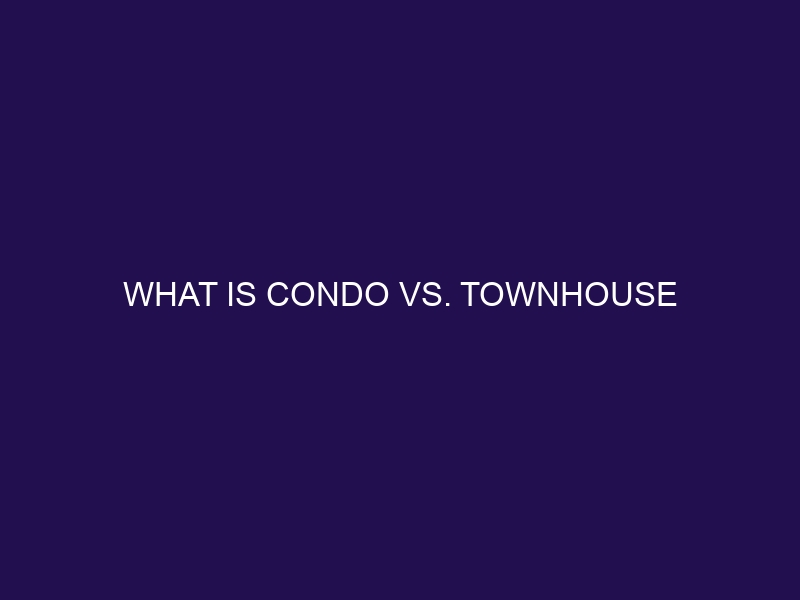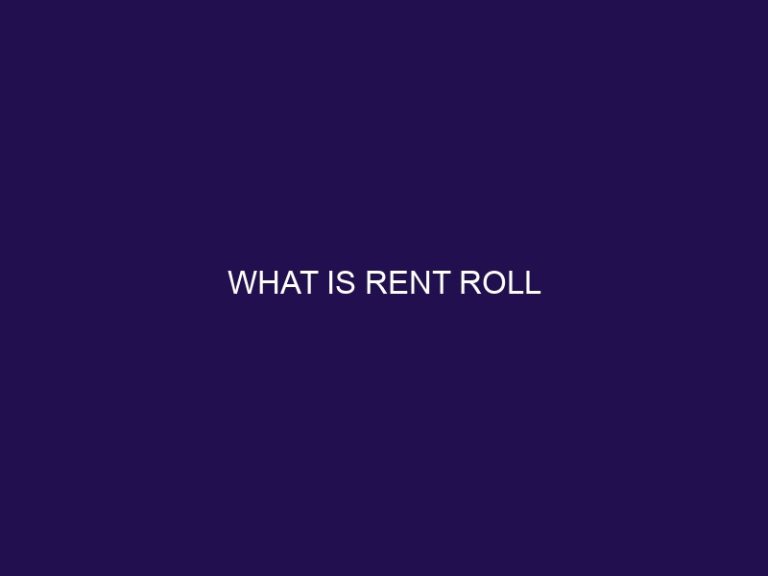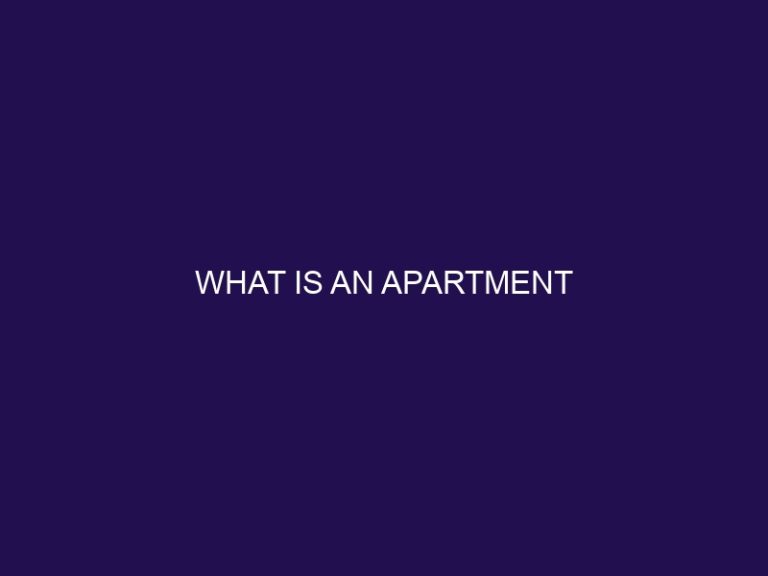What is Condo vs. Townhouse
Condo living and townhouse living are two popular housing options that offer unique benefits and distinctions. Understanding the differences between these two types of properties can help you make an informed decision about which option is right for you.
When it comes to condos, they are a type of housing where each individual unit is privately owned, but the common areas and amenities are shared among all the residents. A condo often refers to a unit within a larger building or complex. Ownership of a condo includes the interior space of the unit while the exterior and common areas are managed and maintained collectively. There are advantages to condo living, such as access to shared amenities like a pool or gym, and reduced maintenance responsibilities. However, there are also disadvantages, such as less privacy and potentially higher monthly fees.
On the other hand, townhouses are single-family homes that are typically connected to other similar units in a row. Each townhouse owner owns their unit and the land it sits on. Townhouse communities may have shared amenities or common areas, but they are generally less extensive compared to condos. Townhouses offer advantages such as more privacy and independence, and often have lower monthly fees compared to condos. However, townhouse living may require more maintenance responsibilities and limited access to certain amenities.
Key differences between condos and townhouses include ownership structure, property management, privacy and independence, costs and fees, and amenities and shared spaces. Condos have a shared ownership structure and centralized property management, while townhouses have individual ownership and may have a homeowner’s association for shared responsibilities. Condos may offer more amenities and shared spaces, but townhouses often provide more privacy and independence.
Ultimately, the choice between a condo and a townhouse depends on your specific needs, lifestyle preferences, and financial considerations. Evaluating these key differences will help you determine which option aligns best with your requirements and desires in a home.
Understanding Condo
Understanding a condo is crucial when considering purchasing a property. A condo, also known as a condominium, is a form of housing where individuals have ownership of their own units but share common facilities with other residents. These shared amenities can include swimming pools, gyms, and communal areas. Condo owners are also required to pay a monthly maintenance fee for the upkeep of these shared spaces. Before committing to a purchase, it is essential to comprehend the rules and regulations set by the condo association.
The concept of condominiums dates back to ancient Rome, where shared ownership of buildings was prevalent. The modern condo concept originated in the United States during the 20th century in response to the need for affordable housing and the desire for shared amenities and maintenance responsibilities. Today, condos have become a popular housing choice in urban areas worldwide, offering convenience and fostering a sense of community among their residents.
What is a Condo?
A condo, short for condominium, is a type of housing that is part of a larger building or complex and is individually owned. So, what is a condo exactly? Well, it’s a residential unit where owners have exclusive rights to their individual units and shared access to common areas and facilities. When considering whether a condo is the right choice, it’s essential to take into account various factors like ownership structure, property management, privacy, costs, and shared spaces. Owning a condo does come with advantages such as maintenance services and amenities. However, it also has some disadvantages, including shared decision-making and the potential for higher fees. To make an informed decision, it is crucial to understand what a condo is and compare it to other housing options.
Ownership and Management of Condos
The ownership and management of condos involve a unique set of responsibilities and benefits. As a condo owner, you have ownership rights to your individual unit within a larger building or community. The management of common areas and amenities is typically handled by a condo association or homeowners’ association responsible for maintaining and managing common spaces, such as fitness centers, swimming pools, and landscaping. They ensure the well-being and harmonious living of all residents by enforcing rules and regulations. Before purchasing a condo, it’s important to carefully review the condo association’s bylaws, fees, and management practices to understand your rights and obligations.
Advantages of Condo Living
Living in a condo offers several advantages that make it an appealing choice for many individuals. Here are the key advantages of condo living:
- Low Maintenance: One of the main benefits of living in a condo is the low maintenance it requires. Most condo associations take care of landscaping, repairs, and security, freeing up residents’ time and effort.
- Amenities: Condos often provide residents with a wide range of amenities such as swimming pools, fitness centers, and common areas. This ensures that residents have convenient access to recreational facilities.
- Security: Security is a top priority in many condos. They implement measures like gated entrances and surveillance systems to ensure residents feel safe and secure.
- Community: Condo living fosters a sense of community through shared spaces and organized social events. It offers residents the opportunity to build connections and relationships within the community.
- Location: Condos are strategically located in desirable areas, such as urban centers or near popular attractions. This provides residents with easy access to amenities and entertainment options.
The advantages of condo living make it an attractive choice for those seeking a convenient and low-maintenance lifestyle.
Disadvantages of Condo Living
- High monthly fees: Condo living often comes with significant monthly fees that cover maintenance, utilities, and amenities.
- Lack of privacy: Living in close proximity to neighbors can result in limited privacy and noise disturbances.
- Rules and regulations: Condo owners must adhere to strict rules and regulations set by the condo association, limiting freedom and autonomy.
- Potential for special assessments: Condo owners may face unexpected special assessments for major repairs or improvements to the building.
- Limited control over decision-making: Condo residents may have limited say in important decisions regarding the management and governance of the property.
True story: Jane, a condo dweller, experienced frustration when the condo association implemented new rules restricting the use of common areas. This limited her enjoyment of the building amenities and caused tension among residents. She realized that the lack of control and freedom, along with the high monthly fees and potential for special assessments, were significant disadvantages of condo living. As a result, Jane started considering alternative housing options.
Understanding Townhouse
Understanding townhouses involves recognizing their unique features and benefits. These properties often offer a combination of privacy and community, with separate entrances and shared amenities like a courtyard or playground. Townhouses are also known for their efficient use of space, making them popular among urban dwellers. They provide homeowners with the convenience of a low-maintenance property while still offering the advantages of homeownership. Taking these factors into account can help individuals make informed decisions when considering a townhouse as a housing option. Moreover, it is important to note that townhouses originated in Europe in the 16th century and were originally designed for the upper class.
What is a Townhouse?
What is a Townhouse?
A townhouse is a type of housing that is typically part of a row or a complex of similar houses. It is characterized by having multiple levels and being attached to neighboring houses on either side. Townhouses often have a small yard or patio and can offer more space and privacy compared to condos. Ownership of a townhouse usually includes the land it is built on and allows for more independence in terms of property management decisions. Townhouses may come with higher maintenance responsibilities and costs compared to condos. When deciding between a townhouse and a condo, consider factors such as your lifestyle, preferences, and financial situation.
Ownership and Management of Townhouses
Ownership and management of townhouses involve a unique set of considerations. In a townhouse, owners have individual ownership of their unit and a shared ownership of common areas. Management responsibilities are typically shared among the owners through a homeowners association (HOA). The HOA is responsible for the maintenance and management of the common areas, as well as setting and enforcing community rules. Furthermore, the HOA collects fees for these services. This setup allows owners to actively participate in the decision-making process and guarantees the community’s effective maintenance. Pro-tip: Before purchasing a townhouse, it is crucial to thoroughly review the rules, regulations, and financial health of the HOA to ensure a well-managed community.
Advantages of Townhouse Living
- Living in a townhouse offers several advantages that make it an appealing choice for homeowners.
- Space: Townhouses typically offer more living space compared to condos, with multiple floors and a larger footprint.
- Privacy: With fewer shared walls, townhouse living provides greater privacy compared to condos.
- Outdoor Space: Townhouses often come with a small yard or patio, allowing residents to have their own outdoor space.
- Sense of Community: Townhouse communities often foster a strong sense of community and neighborly interaction.
- Ownership: Townhouse living typically involves individual ownership of the unit and the land it sits on.
Townhouses have a rich history dating back to ancient Rome, where they were originally designed as urban residences for the affluent. Over the years, they have evolved to accommodate the changing needs of homeowners, while still retaining their charm and architectural significance. Today, townhouses continue to be a popular choice for those seeking a balance between the privacy of a single-family home and the convenience of shared amenities within a community.
Disadvantages of Townhouse Living
Living in a townhouse has its drawbacks that potential buyers should be aware of. Here are some disadvantages of townhouse living:
- Disadvantages of Townhouse Living – Limited outdoor space: Townhouses usually have smaller yards compared to single-family homes, limiting space for gardening or outdoor activities.
- Disadvantages of Townhouse Living – Shared walls: Living in a townhouse means having neighbors in close proximity, which can lead to noise disturbances and privacy concerns.
- Disadvantages of Townhouse Living – Homeowners association (HOA) fees: Townhouse communities often have HOA fees to cover maintenance and shared amenities, adding to the overall cost of living.
- Disadvantages of Townhouse Living – Lack of customization: Since townhouses are often part of a larger community, there may be limitations on exterior modifications or renovations.
- Disadvantages of Townhouse Living – Limited parking: Townhouse communities may have limited parking spaces, leading to parking issues for residents and guests.
It is important to weigh these disadvantages against the benefits of townhouse living before making a decision.
Key Differences Between Condo and Townhouse
When it comes to choosing between a condo and a townhouse, understanding the key differences is key. In this section, we’ll dive into the ownership structure, property management, privacy and independence, costs and fees, and amenities and shared spaces that set condos and townhouses apart. Forget the confusion and make an informed decision based on the facts and figures we’ll explore. Let’s uncover the nuances and make your choice a breeze!
Ownership Structure
The ownership structure is one of the key differences between condos and townhouses. Here is a table comparing the two:
| Condo | Townhouse |
|---|---|
| Owners hold individual units and share ownership of common areas. | Owners have sole ownership of both the unit and the land it sits on. |
| Owners pay monthly fees for maintenance and management of common areas. | Owners are responsible for maintaining the entire property, including the land. |
| Ownership is in the form of shares or certificates. | Ownership is in the form of a title deed. |
| Owners have less control over decision-making processes. | Owners have more control over decision-making processes. |
Given these differences, potential buyers should consider their preferences and lifestyle when deciding between a condo or a townhouse.
Suggestions:
- – Research local laws and regulations regarding ownership structures.
- – Consider the financial implications of maintenance fees and responsibilities.
- – Assess the importance of control over decision-making processes.
Property Management
Effective property management is an essential consideration when deciding between a condo and a townhouse. When it comes to property management, here are the key points to keep in mind:
– Condos: In condos, a professional management company typically handles property management. They are responsible for the maintenance, repairs, and upkeep of common areas. This arrangement offers convenience and peace of mind to homeowners.
– Townhouses: Townhouses usually have a homeowners association (HOA) that takes care of property management. The HOA enforces rules and regulations, manages common areas, and collects maintenance fees. Homeowners have a voice in decision-making through the HOA board.
In both condos and townhouses, the quality of property management significantly impacts the living experience. It is crucial to research and evaluate the effectiveness and reputation of property management in each specific community before making a decision.
Privacy and Independence
When comparing condos and townhouses, privacy and independence are crucial factors to take into account.
In a condo, residents typically share walls, floors, and ceilings with their neighbors, which can lead to a decrease in privacy. The close proximity may also restrict personal freedom and independence.
Conversely, townhouses often provide more privacy and independence as they are standalone units with their own walls and sometimes even separate entrances. This allows for a greater sense of personal space and freedom to make decisions about the property.
The choice between a condo and a townhouse depends on individual preferences for privacy and independence.
If you prioritize more privacy and independence, a townhouse may be a better fit for you. If you are willing to compromise some privacy and independence for the amenities and convenience that condos often offer, then a condo might be the right choice.
Costs and Fees
“Costs and fees are key factors in the decision-making process when comparing a condo and a townhouse. Let’s analyze the two options using a table:
| Condo Living | Townhouse Living | |
|---|---|---|
| Costs | Monthly HOA fees | No HOA fees |
| Parking fees | Limited or no parking | |
| Property taxes | Property taxes | |
| Insurance premiums | Insurance premiums | |
| Fees | Move-in/move-out fees | Limited or no fees |
| Recreation fees | Limited or no fees | |
| Renovation restrictions | Limited restrictions | |
| Utility expenses | Utility expenses |
Considering costs and fees is crucial in order to make an informed decision based on your financial situation and priorities. While condos may have higher maintenance fees, they often provide amenities and shared spaces. On the other hand, townhouses typically have lower fees and offer more independence in terms of property management and renovations.”
Amenities and Shared Spaces
When choosing between a condo and a townhouse, it’s essential to consider the amenities and shared spaces that each option offers. These amenities and shared spaces, such as a gym or fitness center, swimming pool or hot tub, clubhouse or community room, parks or green spaces, playgrounds or recreational areas, BBQ or picnic areas, tennis or basketball courts, and walking trails or bike paths, greatly enhance your living experience and provide additional conveniences for you and your neighbors.
Having access to these amenities and shared spaces can greatly enhance your lifestyle and provide opportunities for socializing and recreation within your community. The concept of amenities and shared spaces in residential communities has its roots in ancient times. For instance, in ancient Rome, wealthy citizens often lived in buildings called “insulae” that had communal bathhouses and recreational areas. These shared spaces were viewed as a means to promote social interaction and improve the overall quality of life for residents. This tradition of providing amenities and shared spaces continues to this day, evolving to meet the changing needs and desires of modern homeowners.
Which Option is Right for You?
Condo and townhouse are two popular housing options, each with its own benefits and considerations. To determine “Which Option is Right for You?“, consider the following points:
- Ownership: Condos are units within a larger building, while townhouses are standalone units with land. Determine if you prefer the independence of owning a townhouse or the convenience of shared responsibilities in a condo.
- Maintenance: Condos typically have maintenance provided by an association, whereas townhouse owners are responsible for their own maintenance. Consider your willingness to handle maintenance tasks.
- Amenities: Condos often offer amenities like pools and gyms, while townhouses may have less extensive amenities. Assess which amenities are important to you.
- Privacy: Townhouses generally offer more privacy with their own entrances and outdoor spaces. Evaluate how important privacy is to you.
- Cost: Condos often have lower purchase prices but higher monthly fees, while townhouses have higher purchase prices but lower fees. Analyze your budget and financial goals.
Frequently Asked Questions
What is the difference between a condo and a townhouse?
The main difference between a condo and a townhouse is ownership. Condo owners own their individual unit and share ownership of the building and common areas with other residents. Townhouse ownership is more similar to owning a detached single-family home, but with shared walls.
What amenities are typically offered in condos and townhouses?
Condos often offer amenities such as pools, gyms, and laundry or valet services. Townhouses may have different amenities depending on the community or building.
What are the pros and cons of owning a condo or a townhouse?
Pros of owning a condo include shared maintenance responsibilities, access to communal amenities, and potentially more affordable costs compared to owning a single-family home. Cons may include less privacy and the need to pay monthly HOA fees. Townhouse pros include more privacy, potential for larger square footage and spacious floor plans, and the possibility of owning both the land and structure. Cons may include greater responsibility for maintenance and potentially higher costs.
Do condos and townhouses typically come with private garages?
It depends on the specific condo or townhouse. Some properties may have private garages, while others may only offer shared garages or parking spaces.
Can condos and townhouses be rented from a landlord?
Yes, condos and townhouses can be rented from a landlord, similar to renting traditional apartments or detached single-family homes.
Are condos and townhouses more commonly found in urban or suburban areas?
Both condos and townhouses can be found in urban, rural, and suburban areas. However, condos are often associated with high-rise luxury buildings in urban areas, while townhouses may be more prevalent in suburban communities.







